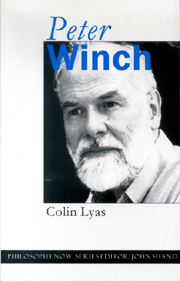Book contents
- Frontmatter
- Contents
- Preface
- Introduction: Peter Winch, a glimpse of a life
- 1 “Such understanding as I have”: The influence of Wittgenstein
- 2 “I was investigating the notion of the social”: The idea of a social science
- 3 “Seriously to study another way of life”: Understanding another society
- 4 “Good examples are indispensable”: The ethical life
- 5 “The concept of God is used”: The religious forms of life
- 6 “The interval of hesitation”: Peter Winch's Simone Weil
- 7 “Someone willing to die for truth”: Peter Winch's legacy
- Envoi
- References
- Index
4 - “Good examples are indispensable”: The ethical life
- Frontmatter
- Contents
- Preface
- Introduction: Peter Winch, a glimpse of a life
- 1 “Such understanding as I have”: The influence of Wittgenstein
- 2 “I was investigating the notion of the social”: The idea of a social science
- 3 “Seriously to study another way of life”: Understanding another society
- 4 “Good examples are indispensable”: The ethical life
- 5 “The concept of God is used”: The religious forms of life
- 6 “The interval of hesitation”: Peter Winch's Simone Weil
- 7 “Someone willing to die for truth”: Peter Winch's legacy
- Envoi
- References
- Index
Summary
The disconsolations of ethics
Three things about ethics, as it is often studied, are responsible for the fact that the subject often does not endear itself to those who are required to study it. On every one of these points Winch's ethical thinking offers a more inviting perspective.
First, ethics is too often narrowly focused on questions about particular right and wrong actions, for example, whether to keep a promise or whether to lie, where these are detached from the whole life of a person and from questions about what makes that life a life worth living. Bernard Williams has it right: “It is not a trivial question, Socrates said: what we are talking about is how one should live” (Williams 1985: p. 1). Winch's contributions to ethics, focused on here, are to do with “what is involved in a man's attempt to arrive at a moral understanding of his own life and of the relations between this and his understanding of his relations with his fellow men” (Winch 1972: pp. 3–4).
Second, the examples used in ethics are often irritatingly trivial (whether to return a library book, for example) and such that no one of any sense would waste a moment's sleep over them. (Winch castigates the reliance on trivial examples (1972: p. 154).) Hence the stress in Winch's work on the need for “good examples”. Few were the equal of Winch in finding interesting examples, often from the world's great literature.
- Type
- Chapter
- Information
- Peter Winch , pp. 101 - 128Publisher: Acumen PublishingPrint publication year: 1999



